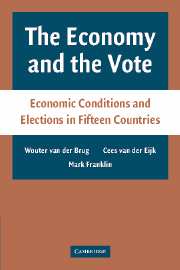Book contents
- Frontmatter
- Contents
- Preface
- Introduction
- 1 Studying Economic Voting
- 2 Party Choice as a Two-Stage Process
- 3 Hypotheses and Data: The Theoretical and Empirical Setting
- 4 Effects of the Economy on Party Support
- 5 The Economic Voter
- 6 From Individual Preferences to Election Outcomes
- 7 The Economy, Party Competition, and the Vote
- Epilogue: Where to Go from Here in the Study of Economic Voting?
- Appendix A The Surveys Employed in This Book
- Appendix B Detailed Results Not Reported in the Main Text
- References
- Index
4 - Effects of the Economy on Party Support
Published online by Cambridge University Press: 18 December 2009
- Frontmatter
- Contents
- Preface
- Introduction
- 1 Studying Economic Voting
- 2 Party Choice as a Two-Stage Process
- 3 Hypotheses and Data: The Theoretical and Empirical Setting
- 4 Effects of the Economy on Party Support
- 5 The Economic Voter
- 6 From Individual Preferences to Election Outcomes
- 7 The Economy, Party Competition, and the Vote
- Epilogue: Where to Go from Here in the Study of Economic Voting?
- Appendix A The Surveys Employed in This Book
- Appendix B Detailed Results Not Reported in the Main Text
- References
- Index
Summary
In this chapter, we will develop and test a model of the effect of objective economic circumstances on individual-level support for political parties. Most of the evidence previously found for effects of the objective state of the economy on party support has been found at the aggregate level (e.g., Hibbs 1977; Tufte 1978; Chrystal and Alt 1981; Fair 1988; Lewis-Beck 1988; Markus 1988, 1992; Erikson 1989; Clarke and Whiteley 1990; Mackuen, Erikson, and Stimson 1992; Powell and Whitten 1993; Price and Sanders 1993; Clarke and Stewart, 1995; Norpoth 1996; Sanders 1996; Clarke, Stewart, and Whiteley 1998; Whitten and Palmer 1999; Campbell and Garand 2000). It has been suggested (e.g., Jacobson 1983; Lewis-Beck 1988: 29–31) that these results may have reflected the ecological fallacy first identified by Robinson (1950), making it problematic to draw inferences from aggregate data about the behavior of individuals. More to the point, in our opinion, even assuming that effects found at the aggregate level are not spurious, aggregate analyses do not allow us to assess the importance of economic circumstances relative to other considerations that affect individuals' electoral choices, such as ideological predispositions or issue preferences, and give us no way of knowing under what circumstances these other considerations might trump the effects of economic conditions.
We will start by replicating with our data models of economic voting used in aggregate analyses, in which party choice is typically predicted only by the previous vote share of government parties (to control for time-serial dependencies) and by interactions of a government party dummy variable with measures of the state of the economy.
- Type
- Chapter
- Information
- The Economy and the VoteEconomic Conditions and Elections in Fifteen Countries, pp. 82 - 116Publisher: Cambridge University PressPrint publication year: 2007



